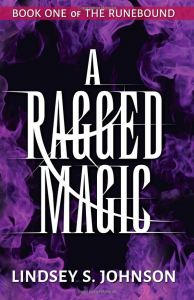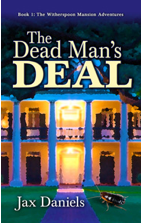Rhiannon has the Sight—the ability to glimpse the hearts and minds of others. Branded a witch, her family is executed and she is turned over to a powerful kirche where the bishop wants to use her power toward his own ends—the throne. Thrust into intrigue and danger, Rhiannon must learn to control her growing power, and master …
A RAGGED MAGIC.
Now that I have a book published, and I am talking to people about it, I’m starting to get some of those author questions that I’ve heard so much about. Since I write YA (young adult) fantasy, one of the questions I’m getting a lot is: Why? Why YA? Why teenagers?
Not to be flippant, but why not? I like YA. I have read it since before there was even a YA category in most bookstores. I love it—the intensity, the pacing, the protagonists. Teenagers make great main characters. They’re full of everything—they’re trying everything. Even when the protag is lost or depressed or feels broken, they have a capacity for so much change because they are in the midst of so much change in themselves. They are in the midst of becoming, like most of us, but they don’t have the history of themselves to guide or to distract them. I love that about teenagers, even while I remember how hard it was to be in that place.
YA authors write for young readers because we like teenagers, we care about them. We want to have conversations with them, with ourselves, with our society. I feel a little like the question “why write YA?” (sometimes paired with an implied sneer, because why aren’t you writing real books for real people) is so short-sighted. Why not write for teenagers? Why not write about them? Teenagers are real people.
Teenagers are pretty cool. It’s a hard attitude to promote, because our society is hell-bent on saying otherwise. I remember as a teen that my age group and class were constantly told how terrible we were, how badly behaved, how much worse we were than the class before. We were The Worst, always. But I also remember that being said about the classes before me, the classes after me, and I see now how every class or generation that comes next is always The Worst: the laziest, the cruelest, the pettiest, the most horrible and entitled. (Throughout all of written history, so many people who have grown up are in love with the shaking of canes and saying “kids these days” as though that same thing wasn’t said about them when they were kids.) Despite the belittling and concern-trolling, I see evidence of such kindness and growth and responsibility in teens. Teenagers are not adults, it’s true, and their brains aren’t finished forming, or their bodies, or their emotional capacity. But that doesn’t mean they aren’t capable of great things, either individually or as a group.
And I think those stories should be told. I think teens need to see themselves in story and also see others—people they aren’t like. Teens, like all humans, need story to teach them empathy, to teach them bravery, to teach them compassion; story to teach them how to think about things and reason through problems. And also just for sheer entertainment—a good story is one which makes you want to read and makes you glad you did. Why shouldn’t teens have such stories? Stories made with them in mind?
I think it’s important to tell teens that we see them, that we’re listening, and then actually listen. It’s important to show boys who have empathy, girls who are the strong, silent type; to see all our differences and acknowledge and embrace them; and to listen to people who are new to us. It’s important for kids—girls, boys, gay kids, lesbian kids, bi kids, trans kids, Black kids, Latin@ kids, Native kids, Asian kids, disabled kids, mentally ill kids, nerdy kids, jock kids, theater kids, migrant kids, complex combinations of any and all those things and more kids—that we see them, and they see themselves mirrored in story. They can be heroes, can be villains, can be both and in between; can be complex and confused and brilliant and stupid and full of life and lying on the ground in the muck, just really, really sick of life, and it’s OK. You get to make mistakes, fall down big time, and have to learn how to get back up again. It’s true for everyone sometimes: children, teenagers, young adults, adults, the elderly—all of us. And we can reach out to each other and help each other and learn from each other. You can see yourself reflected in whatever bits and pieces of culture you choose, and other people don’t get to tell you that you don’t matter. You do matter. You get to be you, and be awful and great all at once, both/and.
I like teenagers. I like writing about them, I like writing for them, and I like reading about them. If you survive to adulthood, you were a teenager—it might be hard to tap back into those moments, that newness, that intensity, that “everything is important because it’s the first time, and everything is off the charts because that’s how my brain processes life,” because let’s face it, it is exhausting being so much of an emotional lightning rod all of the time. When I say “survive to adulthood,” I mean it can be pretty fraught to be a kid sometimes. It’s important to remember how you felt, how you thought, how you functioned then. You might be able to look at it from your adult perspective and say “Wow, I was a jerk, or I was confused, or I was an emotional mess, or I was so very wrong.” But I think it’s important to remember that you didn’t know that, you couldn’t know that yet, and you were doing the best you could, like most everybody, moment by moment. You were just trying to live a life that was baffling and fantastic and horrible and infuriating and wondrous by turns, tossed about on the tide of your changing physical and emotional body, learning, growing, changing, and charging ahead. Just like now, but with a lot more tossing tides and information being flung at you everywhere you turned.
Which is part of what makes it fun to write about. All those changes, all that information, all that intensity—how can I resist exploring it? Why would I want to? Throw in sociopolitical unrest and religious upheaval and magic, and I’m hooked every time. So I write my protagonists as teenagers and young adults, and I explore what happens when people who are still learning how to be people try to figure out what that means. I hope as I explore and open the conversation, others are reading and exploring and conversing with me. It’s a good ride, and I plan to keep on it for awhile longer.
Lindsey S. Johnson has an appreciation for dramatic flair paired with a sense of the ridiculous, which leads to things like getting a black eye via accidentally setting her sweater on fire when reaching for the wonton soup. She started telling stories to her best friend at an early age, mostly to justify creating elaborate forts for dolls.
Lindsey lives in Seattle with her significant other and two cats named after sorceresses. Why have one black cat named after a villainous magic-wielder, when you can have two? A Ragged Magic is her first published novel; she is currently at work on the second book in The Runebound series.
*Title is from the song “Are You Out There” by Dar Williams.




Pingback: Welcome me to a haven given… | Lindsey S Johnson